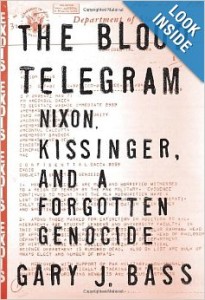
Gary Jonathan Bass
Although the two superpowers managed to avoid a cataclysmic disaster during the almost 40 years of the Cold War, the same could not be said of the many states “standing-in” as their ideological proxies. The list of nations suffering various degrees of irreparable damage as a result of the “Cold War” is almost unending. Among them, one would be remiss not to include Cuba, Angola, Vietnam, Laos, Cambodia, Indonesia, Nicaragua, Grenada, Chile, Guatemala, just to name the ones that come immediately to mind. Two other such nations were India, a Russian ally; and Pakistan, a U.S. ally. Both suffered immeasurably in the genocide exposed here.
As the author tells the story, Pakistan just happened fortuitously to get tripped into a genocide that cost more than a million (mostly Hindu) lives, merely by being in the path of destruction that rippled across the geopolitical landscape called Nixon-Kissinger Cold War realpolitik.
Bangladesh, still experiencing birth pains more than two decades after the 1947 British colonial partition, a partition in which India was brutally divided religiously into two countries, with Muslim wings a thousand miles apart, a blood-thirsty and mediocre despot named Agha Mohammad Yahya Khan, was embarking on his own private campaign of ethnic cleansing, one in which he needed more guns with which he intended to use to either eject or kill as many Hindi within his borders of East Pakistan as he could.
Fortuitously, he was able to get unexpected help in his sinister genocidal project in the form of geopolitical leverage over his favorite superpower and Cold War overseer, the USA. It turns out that at the very time that he needed guns and other military hardware to carry out his genocidal plans, Nixon and Kissinger needed Khan to act as a go-between to help open doors to China as part of their most desperate last ditch diplomatic maneuver to get the U.S. out of Vietnam.
As a result of this windfall in leverage, this mediocre South Asian General got to play in the geopolitical big leagues for a brief moment. Behind the scenes he was able to eke out a quid pro quo for arms in exchange for “a free pass” to use them in his genocidal plans against the Hindi.
While he was using the U.S. as a shield for his unconscientionably genocidal project, Nixon and Kissinger looked on with glee, making snide insulting remarks (all recorded on tape) about Indian leader Indira Gandhi. Not until the death toll had reached more than one million, with four times as many refugees flooding into India, however, did Prime Minister Gandhi, mercifully intervene by invading Pakistan and quickly putting a stop to the carnage.
It was not the Nixon-Kissassinger administration's finest hour, for it would be difficult to exaggerate the crudity, vulgarity and lack of taste with which our president and top diplomat were caught on tape knowingly assisting in genocide, and calling Prime minister Gandhi an “old bit-ch.” To add insult to this geopolitical embarrassment, like Mr. Obama, Dr. Kissassinger also went on to become a Nobel Prize winner.



